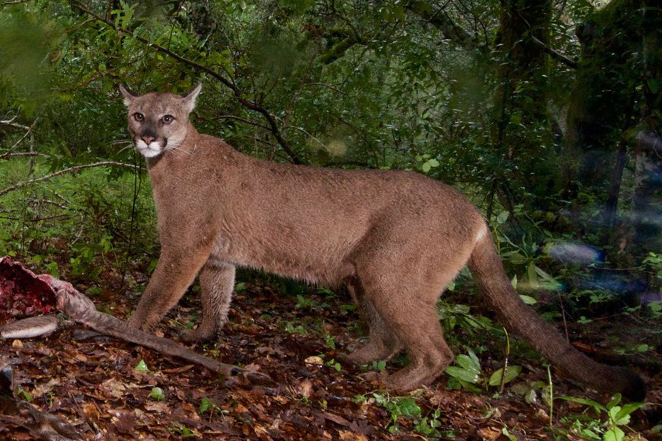“We know the cats are out there,” said Dr. Quinton Martins, principal investigator of Audubon Canyon Ranch’s Mountain Lion Project. “We don’t know how many there are, whether the population is healthy, or how they are moving through the landscape.”
Together with a team of ACR staff and advisors, Dr. Martins will study mountain lions within an area that encompasses approximately 1,000 square miles, primarily in the Mayacamas Mountains (areas east of Hwy 101 and west of Hwy 29) in Sonoma and Napa Counties, including the ACR’s Bouverie Preserve in Glen Ellen.
“By expanding our knowledge of mountain lion behavior, population size, feeding habits, home range, and movements, we can contribute to their conservation,” Dr. Martins said. The effort will go far beyond the camera trap data (example above) collected by the ACR and other agencies, to include an extensive education and outreach program.
Because mountain lions have large ranges and special habitat requirements, their conservation leads to broader environmental protection, connectivity and species preservation, said Jeanne Wirka, ACR’s Director of Stewardship. “Long-term sustainability of a mountain lion population represents maintenance of an intact and functioning ecosystem.”
ACR’s research goals include using the data on how mountain lions actually move in the landscape to inform conservation efforts.
ACR’s research will be paired with an extensive education and outreach program. “ACR recognizes that conservation is most successful when people feel personally connected to nature,” said John Petersen, ACR’s Executive Director. “There is a terrific level of interest in large mammals living within the Sonoma-Napa-Lake mountain ranges and little doubt that mountain lions inspire awe, curiosity, and sometimes fear in a way that few other animals do.”
The ACR Mountain Lion Project will build on ACR’s deep ties to local communities in the Bay Area through its school program (serving over 6,000 elementary school students each year), lifelong learning, and public programs. ACR staff are also reaching out to and meeting with individual landowners in the study area to involve the community in the research as well as offering ideas on how best to mitigate human-mountain lion conflict.
The ACR Mountain Lion Project is part of the Bay Area Puma Research Cooperative, which includes the California Department of Fish & Wildlife, Felidae Conservation Fund, and Panthera. Permits for the capture and collaring of mountain lions have been submitted to the California Department of Fish and Wildlife and are currently being processed. In the interim, Dr. Martins and other ACR staff have been laying the groundwork by reaching out to local landowners, developing research partnerships, and surveying communities on their perceptions of mountain lions.
Dr. Martins is the former founder and CEO of the Cape Leopard Trust, a successful predator conservation NGO based in South Africa. He has over 20 years of field experience having worked in wilderness areas throughout Africa, Saudi Arabia and the USA.






Recently, I am very interested in studying animal species, which are very few. Thank you for interesting article. Good luck and success to the project ACR Mountain Lion.